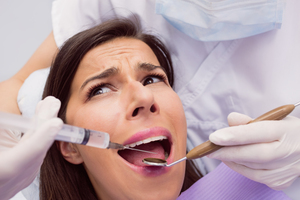Is Sedation Dentistry Safe?
If you have some anxiety about going to the dentist or are nervous about an extensive dental procedure you might need, you’ll likely be wondering about sedation dentistry. You’ve heard that it can alleviate your anxiety and prevent you from feeling pain during a procedure. But is sedation dentistry safe? Let’s take a look.
What kinds of sedation dentistry are there?
There are several different variations of sedation dentistry. There is IV, or intravenous, sedation, nitrous oxide, and oral sedation. The type you need depends on several factors.

If you have a painful dental surgery coming up, you might need IV sedation so that you will be asleep through the procedure. Alternatively, if you’re just getting a filling, you might only need oral sedation to feel calm or an injection to numb the target area. In some cases, your dentist might opt for using nitrous oxide or laughing gas to alleviate anxiety, as well.
Whatever your dentist recommends, they will also verify to make sure it’s appropriate for your unique risk factors and state of health.
How does the dentist make sure it’s safe for you?
While most forms of sedation dentistry are safe for an overwhelming number of patients, your dentist will reference your precise medical history, the current state of your health, and your unique risk factors to determine what kind of sedation dentistry will be the safest for you.
That’s why it’s important to inform your oral health team of any health problems you have, including allergies to any medications, any medications you are currently taking, and medical conditions not seemingly related to your oral health.
These health-related details will help your dentist determine if a particular form of sedation dentistry is right for you. They will also monitor your vital signs at all times throughout your procedure to ensure you’re not having any problems.
Everyone is different
Everyone is different, and anyone can have an adverse reaction to sedation dentistry. Your dentist, however, will ensure that only trained professionals administer and monitor your sedation and health throughout the procedure.
Additionally, your professional team will typically keep remedies on hand that can reverse the effects of the sedation if you begin to have an adverse reaction. Your dentist will also discuss any and all risks with you before giving you any kind of sedation.
Call us for more information
At the office of Dr. Benjamin Duval, we take your oral health seriously. Call our office today, and we’ll be happy to answer all your questions about sedation dentistry and any additional concerns you might have about preserving your oral health and perfecting your smile.